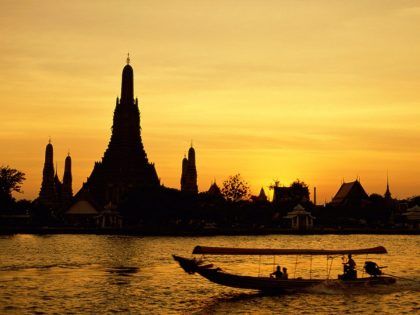In Deep With Punnat Punsri And His Fairy Tale Career; In Contention For GPI POY

Since his first tournament win, Thailand’s Punnat Punsri has been carving out one of the most consistent résumés in tournament poker with titles across Asia and deep runs in some of the world’s toughest fields. Today, Punsri has his eyes set on the ultimate poker recognition: the Global Poker Index (GPI) world No. 1 ranking and the Player of the Year title.
As he continues his chase, we had a chance to chat with Punsri to talk about his beginnings, the grind, the milestones, and struggles that shaped his journey, and being in the company of poker’s most elite.
Punnat Punsri: Early Fascination With Poker
How did you first get into poker?
In high school back in Bangkok, I was already fascinated with poker due to the movie James Bond Casino Royale, in addition to shows on YouTube such as High Stakes Poker, as well as the televised coverage of the World Series of Poker. At home, I used to play a lot of card games with my cousins at family gatherings. It wasn’t for money, just friendly games like gin rummy, Big 2, and eventually a few poker variants. Five-card draw was one of the first versions I learned from my dad. When I encountered NLH, I was so intrigued that I asked my dad if we could play together, and we did. Later, when I started hosting house parties, my friends would join in too. That was the foundation.
When I turned 18, I moved to the UK for university. I still remember it clearly – I had just celebrated my birthday on August 28, and a couple of days later, I arrived in Bristol for my bachelor’s degree. My dad helped me settle in then we explored the city. That’s when we found a local casino just a 10-minute walk from my university department.
We walked in and saw both a tournament area and a cash game section. Since it was legal to play at 18 in the UK, I sat down at the 25p/50p cash game. I bought in for £50. My very first memorable hand, I was dealt aces. I got it all in on a board of 5-3-2 rainbow against someone holding 4-6. I was behind, but somehow I hit a running full house as it came 5-A. I turned that £50 into £150 that night. That was it – I was hooked. I started going back regularly.
Punsri Shifts To Tournaments
When and why did you make the transition to tournaments?
After university, I was doing well in high-stakes cash games, but by 2019 I felt I needed a new challenge. Many games were becoming private and political, and I remembered my dad always telling me to try and challenge myself at tournaments. I looked at Thailand’s Hendon Mob page and realized very few Thai players were competing internationally. I wanted to change that. Around that time, I had a trip planned with my friends to Seoul for a music festival and saw there was an APT Korea Seoul event the week before. So I went and played the APT Championship Event and I made the final table then won it.
Punnat Punsri wins the first-ever APT Korea Seoul Championships Event title
That got my blood flowing. Even though the money wasn’t as big as cash games, winning that trophy gave me a real taste of tournament success. It was like a surreal moment in my career that I managed to win this trophy. It was a very proud moment.
Later that year, I final-tabled again in Taiwan, which was also the first time my dad saw me play on TV. He told me I made good plays but was still reckless. Obviously I was a beginner back then and didn’t understand ICM or anything like that. That pushed me to study more seriously.
When covid shut things down, I used that year and a half to improve my overall poker game with the help of close friends, mainly Matthew Belcher. He said that the way I played, there was no way I was going to even beat an average game in Europe or America. That was when I realized how little I actually knew about the game – and how much I needed to learn in order to compete at a high level.
First WSOP And Vegas Experience

Tell us about your first Vegas experience and your first high roller wins.
In 2021, I made my first trip to America for the World Series of Poker. At that time it was in November. It was overwhelming, walking into the Rio for the first time – the scale, the atmosphere, the number of players, this was a different world. I remember being so nervous. I played seven or eight events with buy-ins of around $1.5K to $5K plus the Main Event. I had a magical run at the Main Event, made Day 5 alongside my fellow Thai competitor Phachara Wongwichit. At one point, I was top 10 in chips and was ready to text my dad, and then in just two hands it was gone – aces cracked by sevens, then lost big a flip AK vs QQ. From euphoria to utter disappointment in literally minutes.
I still made quite a good profit, so I decided to stay for the WPT Five Diamond and PokerGO events – that’s where I got my first taste of high roller tournaments. I reached three final tables and was about to go home for Christmas when I got covid. So I stayed and played the Venetian High Rollers after the new year. It was my chance to play against some of the best in the world, some of them I played with during the WPT, but a smaller field. Also I was basically parlaying my profits.
It’s pretty funny. I became the new kid on the block, as I ended up winning the first two high rollers of 2022. The first one, I chopped with Eric Seidel because it was already quite late. We were quite tired, and we wanted to come back to play the next day. That next day, I reached heads up again this time versus Chris Brewer, who is a very good player and we played it out – we didn’t chop and I was lucky enough to beat him.
I remember selling a small amount of action because I wanted to be able to rebuy for the 10Ks but not a lot, I think maybe 20-30%. I was lucky I didn’t have to rebuy much. I was in for one bullet for most of the events and it was a great experience overall. Winning back-to-back 10Ks gave me confidence, but also showed how much work I still needed to do.
The Bracelet That Got Away
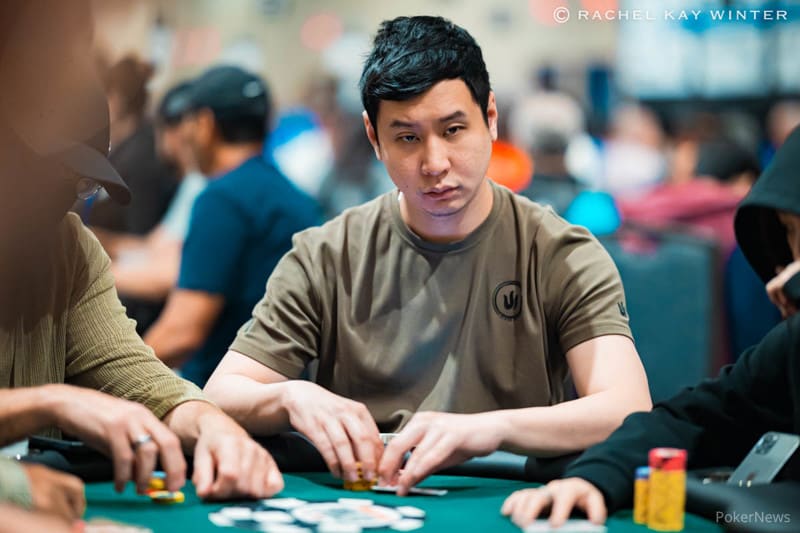
Based on your stats, you returned to the WSOP in 2022 and nearly landed a bracelet. Tell us about that experience.
At the 2022 WSOP, I had a breakout summer: eight cashes, a 3rd place in the $50K High Roller, and a deep run in the Millionaire Maker that had almost 8K entries. The one that hurt was finishing runner-up in the Hall of Fame Bounty event to Jinho Hong. I thought I had it. I felt like it was my chance to win a bracelet for Thailand. But I got coolered, then lost aces vs A-4 offsuit all in preflop for the knockout blow. I was quite sad about that.
Video below: Credit Goodfold YouTube channel
I remember I congratulated to him because it could have gone both ways. I remember I was telling him before heads up started that no matter what happens, this will be a historic win because an Asian is winning this and it will be the first bracelet for either of us. And he was a great guy, but personally I was very disappointed. Back then I didn’t have that many friends in Vegas so I went out and I sat outside alone for like 30 minutes to try and reflect on the whole series.
This gave me extra fire to try and succeed even more in tournament poker, on top of making me realize that I cannot be complacent. I still made many mistakes. I knew I needed to do everything in my power to capitalize on these moments if I’m given such opportunities again in the future.
Entering The Triton Arena

How did your first Triton experience come about, and what was it like stepping into that Super High Roller stage for the first time?
Shortly after 2022 WSOP, I was lucky that Danny Tang reached out and invited me to Cyprus for Triton. At the time, I was still very new to high-stakes tournaments – barely six months in – so I was placed in the “businessman bracket” of the $200K Coin Rivet Invitational. Kannapong and Phachara were in the same bracket, so we all decided to go. Unlike WSOP where it felt like the Olympics of Poker, at Triton, it felt like walking into the Champions League of poker. All the big names I had watched on TV, and the top businessmen from around the world, were in the same room.
I played five events. I bricked the $25K, then bubbled the $50K final table in 8th, cashed for almost 4x the buy-in, which gave me my first Triton deep run. I also took a shot in the $200K Invitational – two bullets, but no cash. Was first to bust, then lost a huge pot with kings versus aces against Fedor Holz deep in the tournament on my second bullet. The only event left was the $100K Main Event.
Before Day 2, I decided to play the TV cash game for the first time. Michael Addamo was on the list, he is my personal hero. I really like the way he plays and he understands theory very well. He tries to find ways to exploit other good players and deviate from baseline strategies in ways that are still plus EV, but also understands how to best play against weaker players which I think is a very cool skill set to have. He is one of the reasons why I wanted to play high stakes because I wanted to do some of the things he does.
I remember there was me, him, Jungleman, Wayne, Santhosh and Leon. I had a decent start then I lost Aces full to quad Eights of Jungleman. I lost the 800K pot and thinking if I would get another chance to play on an elite stage like this again?
Victory At Triton Main Event

Then you turned it around and won the Main Event, tell us about that.
At that time, I had already set a goal of reaching Thailand’s All-Time Money List. At the Triton Cyprus Main Event, I still remember going all in with aces against Stephen Chidwick’s tens; he rivered a straight. I’m like what the hell? Why is my series like this? At least let me cash or something to end the trip on the high? But eventually, I got some shoves through and then I outlasted Chidwick. He ended up bubbling. I remember I went back to my room, I called Matt. We were over the moon because I was guaranteed to go top of Thailand’s All Time Money List, but I still had work to do.
I only had 11 bigs and I had to double up. There were 13 left, all in the money, the next step was to reach the final table. I went back and I doubled through Seth Davies, and then I ended up making the FT. By then, I had already exceeded my own expectations. I’m just gonna do what I think is best, and I’m just going to go for it. And yeah, I won. The rest is history. It was unbelievable.
Since then, you have been consistently successful in these super high roller events, especially at Triton. Why are these events such a strong fit for you?
I immediately felt an emotional attachment to the tour. The hospitality, the production, the atmosphere – it’s every poker player’s dream. Ever since the first time, and even though I won the main, I needed to improve a lot. So I set a goal that every time I came back to each one of these, I’m going to be a better version of myself. I am going to take my time and slowly learn things in the way that will improve me step by step.
In Vietnam, the results didn’t quite come, but I made two final tables that kept me even. Then in Cyprus and later London, things turned around. London was especially meaningful. I came in with a sub-optimal mindset and bricked everything up to the $250K Luxon Invitational. By then, my results had improved enough that I moved from the businessman bracket into the pro bracket, something I was actually very proud of. I won the APT Taiwan Main Event as well earlier that year, came 5th in the $200K Invitational in Cyprus, and had some decent runs at the World Series that people thought I should be part of the pro bracket now.
On Day 1 of the Invitational, my first as a pro, I was going to play a bit tight and try to survive which I did on one bullet. I had a heater towards the end of Day 2 to make back-to-back Invitational FTs. I eventually finished 3rd for $3.1 million – my biggest score till this day. It was an unforgettable milestone and a reminder of how far I’d come since that very first Triton series. That was one of my proudest moments.
Punnat Punsri Wins Third Triton Title
Preparing For The Big Games
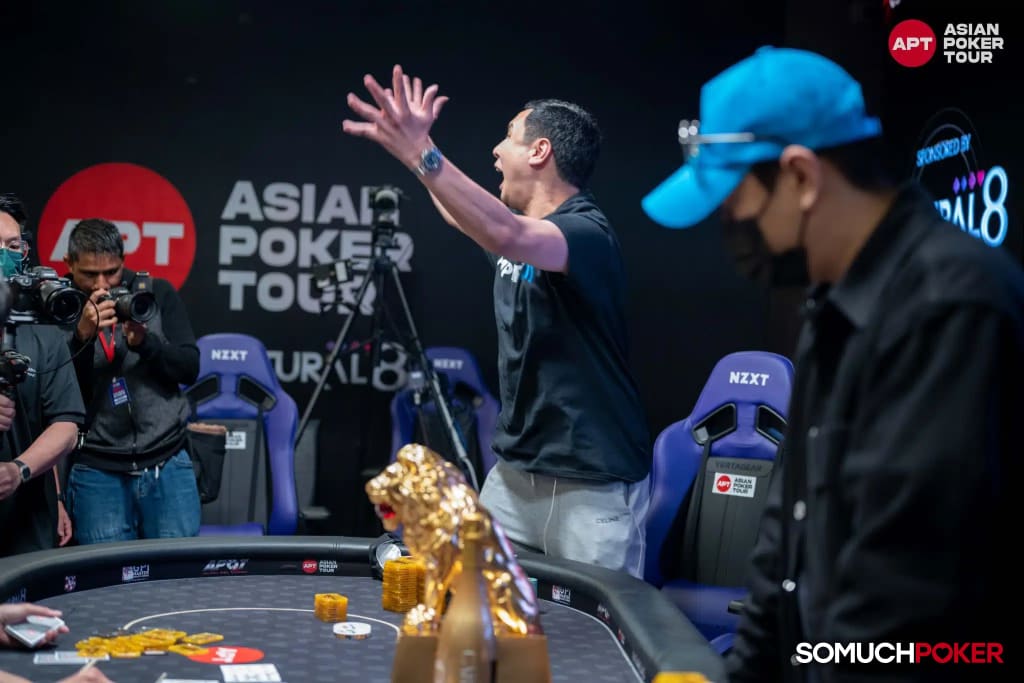
How do you prepare for these big games?
I approach the game in different ways. I study with peers, but I also work on areas where I feel I need extra help – like short-stack play, bubble spots, and ICM. Sometimes I bring in coaches who specialize in certain aspects, because no one knows everything about poker, but everyone has strengths you can learn from. I try to incorporate the best attributes of individuals who are willing to help me into my own game.
I also review footage of myself and my opponents, studying interesting hands and comparing population tendencies to theory. That’s where you can find small edges – whether it’s over-folding in certain spots or applying pressure where players tend to be too tight. The deeper I go, the more I realize how unsolved ICM still is, so I pay special attention to final table dynamics and player compositions. At heart, I’m still a student of the game, and I love it as much as ever. Now that I’ve ventured into PLO, there’s even more to learn. But even in Hold’em, I mix theory with intuition – I like to improvise. There’s always something new to refine, something I can come back stronger with.
Where I’ve been less disciplined is the physical and mental side of things. For three years I wasn’t as healthy as I could be. Long sessions take a toll, and after seven or eight hours I wasn’t always playing my A-game at times. Lately I’ve been trying to fix that – morning walks, having a gym routine, and working with a mindset coach to keep myself organized. I’ve also learned to stay calmer. Mistakes used to tilt me, but now I reset quicker and fight with whatever stack I have left. I think resilience is one of my strongest qualities – I give every bullet my all from the start to the very end.
You’ve talked about working on the mental and physical side of the game. Where do you think your biggest edge comes from?
I think early on it came from players underestimating me in certain areas. I won’t specify exactly which, because those are the spots I work on privately in my free time, but I noticed that the population was reacting sub-optimally to some of the lines I took. That gave me an edge, and I managed to do well there. Of course, I also ran really well – luck plays a big part – and what I gained in some spots, I lost in others against the very best players. Over time I’ve tried to close those gaps and catch up in the areas I was previously lacking.
Another edge I think I have is adaptability. I’ve played against people from so many different backgrounds and playing styles – pros, businessmen, recreational players, aggressive newcomers. Especially on the global stage, you get players from all over the world. I feel I’ve adjusted quicker than some of the top regulars, simply because I’ve had more exposure to diverse games: private games, different stakes, public games in the UK, Macau and events all across Asia. That variety sharpened my ability to recognize tendencies quickly and build exploitative strategies on the spot. I’d say that’s my biggest strength – being able to adapt fast to whoever’s across the table.
Overall, I think experience matters a lot. At final tables or under big pressure, I’ve seen even top regs make small mistakes. Some of the newer players, who are extremely well-studied, can still crack under pressure if they don’t have as much high-stakes experience.
I’ve been there too. I remember my first Triton in Cyprus – no time banks left, nerves high. I shoved 70 big blinds with tens against Limitless’ Ace-King. It was an ICM disaster; you can only jam kings there. But I got lucky, won the flip, and no one talked about the mistake because it worked out. That taught me a lot. Over time, those experiences made me more composed. Nowadays, I trust that in high-pressure spots, I can still perform close to my best.
Fatigued At Triton One Main Event

At the recent Triton One and Triton Jeju, you captured your fifth title but it was nearly six. Run us through heads up against Joshua Gebissa.
Going into heads-up, I had a 4-to-1 chip lead, but Joshua Gebissa still had 30 big blinds—that’s plenty of play left. The problem was, I was completely exhausted. I’d just flown back from EPT Barcelona during my birthday, spent two days in Thailand for business meetings, then immediately flew to Triton One. I played the Mystery Bounty, busted, and jumped straight into the Main. By the time I got to three-handed with Daiki and Joshua, I was running on fumes.
I thought I played the final table well overall, but fatigue made me slip in spots I usually wouldn’t. One big hand against Daiki – I three-bet king-five offsuit in a spot where I should have just flat against someone who calls a lot. On the flop, I realized I’d put myself in a terrible spot. Luckily, I hit a five and held on correctly, but it could have easily gone the other way. If I’d lost, I would’ve tilted hard at myself.
When heads-up began, Joshua offered a deal. He’s an online specialist, strong in that format, and he was also chasing the 100K bonus he qualified through QQPK. For him, locking up extra money made sense; for me, the trophy was everything. So we agreed to a straight chip chop. In a way, that took pressure off me – but maybe too much. I lost focus, I played too aggressively, and made some poor preflop choices. Hands like 9-3 suited and Q-2 offsuit were unnecessary to iso-raise or three-bet respectively at 30 big blinds effective, but I was so tired I didn’t adjust properly.
Losing that event hurt because with that kind of lead and dominance throughout the final table, you expect to close it out. And for me, it was about more than money—it was legacy. Winning both the Triton Main Event and the first-ever Triton One Main would’ve been historic, especially since I was part of the launch campaign and also represent the tour’s main sponsor QQPK. The pressure wasn’t monetary, it was legacy pressure.
Afterwards, I called Matt and reviewed every heads-up hand. I knew I needed a refresh, to fix what went wrong. And it came full circle: a few events later, I went heads-up again—but this time, I executed perfectly and won my fifth Triton title. To now be tied with Phil Ivey, Danny Tang, Mikita, and Bryn for five titles, that’s surreal. That earlier loss stung, but it gave me exactly the lesson I needed.
Managing Risk On Big Buy-In Events
Because these buy-ins are so big, do you find yourself spots where you’re under-rolled especially at Triton where players tend to re-enter?
So, the way I approach it is by setting a maximum stake I’m comfortable investing in each series. Of course, that number grows over time, but these buy-ins are massive and the variance is huge, so it’s important to lower the risk where possible.
Even now, I still sell action for the biggest events and keep a set percentage of myself. That way, across the board, I’m effectively playing every high-roller event at a fairly similar buy-in level. Obviously, there are exceptions. If I feel a tournament is especially good value, I’ll take more of myself, especially if I’ve had a good year. If the field looks tougher or more average, I’ll sell more.
So it’s not about being over-rolled or under-rolled – it’s about being disciplined and consistent with bankroll management. That way, I can keep playing every event responsibly without exposing myself to unnecessary swings.
Chasing GPI POY
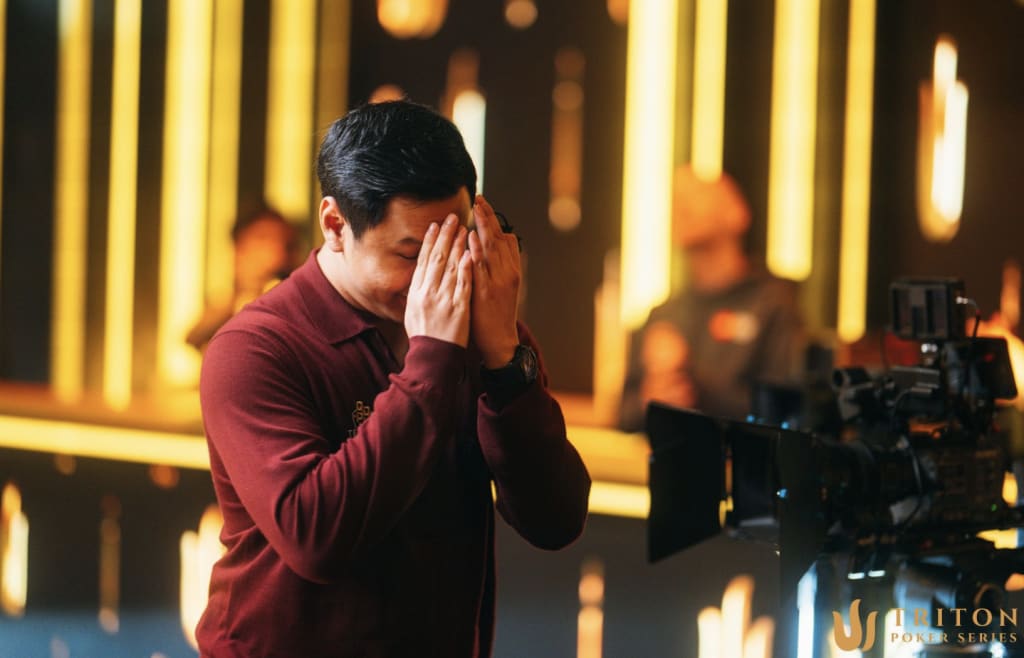
You are high up in the GPI rankings, in the race for Player of the Year. Are these titles you’re actively chasing now that you’re in contention?
It started at Triton, Artur won the Triton POY. But I’m proud that I pushed him all the way. Even after I won the 50K, I cashed both the Hold’em Main and the PLO Main. If I had gone just a little deeper and made those final tables, it could have been a very close race.
Still, it was fun and I’m grateful for the journey because it pushed me out of my comfort zone. Even without winning Triton POY, I still took home three trophies this year and became a five-time champion, so I can’t be disappointed.
As for GPI and GPI POY, Artur is also leading there, but the rankings shift every week. With my fourth-place in the 75K, I might even overtake him next week. Jesse Lonis and Alex Foxen are also right in the mix, they’ll be grinding Vegas for the next three months and both have a lot of opportunities left to go top. Last year the POY race went down to the final week, so I expect this one will too.
I’ll give it everything until the end, and whoever wins will deserve it. But for me, a GPI POY title would mean more than just a personal milestone, it could have an impact back home. I’d likely be the first Asian player to ever win it, and that would be a statement for my country as it continues to explore legalizing poker.
At the end of the day, though, I already feel blessed. My career has been like a fairy tale. Winning more Triton titles, maybe a WSOP bracelet one day, would be incredible – but what matters most is that I keep improving, stay competitive, and continue to put myself in positions to win.
Loving The Tournament Grind
Do you still get nervous when you sit down to play?
That’s why tournaments are fun. I wouldn’t say nervous but I definitely feel anxious when a final table or a real trophy shot is within reach. That feeling doesn’t disappear, and I actually like that it keeps me sharp. Tournament poker suits me because I love that emotional high: making the FT, running deep, that mix of pressure and excitement is different from cash games, where everything is a bit more money-driven and, for me, less thrilling.
I’m quite bankroll-conscious, so I don’t put myself in spots that are wildly outside my comfort zone. But when it’s a big event, especially a bracelet or a major Main, the nerves come back. I remember a bracelet event where I was deep and so nervous at five left. I reached heads up and had a hand where I got it in with A-2 on an A-5-4 flop against 7-5 for the win. It was so nerve-racking. And then the turn brought a devastating seven.
What’s changed is how I handle it. I’m calmer now. I take more time to think, I reset faster after mistakes, and I make clearer decisions at the end of long sessions.
QQPK Ambassador & Your Gateway to QQPoker
Punnat Punsri officially joined QQPK as a brand ambassador, representing the next wave in online poker.
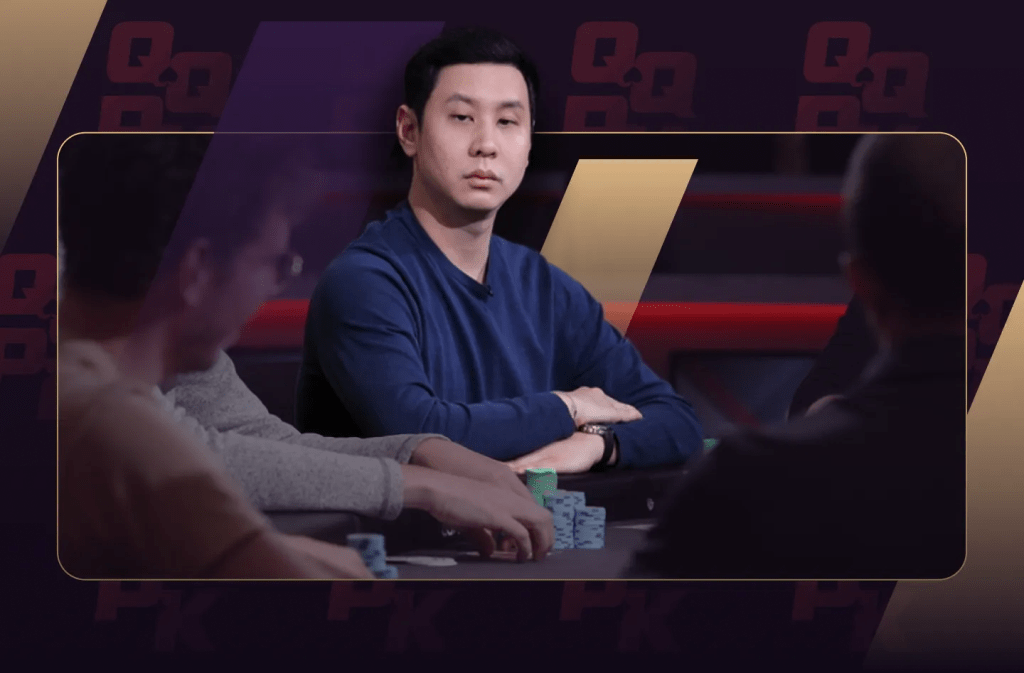
If you want to know more about QQPoker, check out our detailed QQPoker review – we cover its games, features, bonuses, and overall experience, and don’t miss our QQPoker invite code page, where you’ll find our exclusive offer.
















